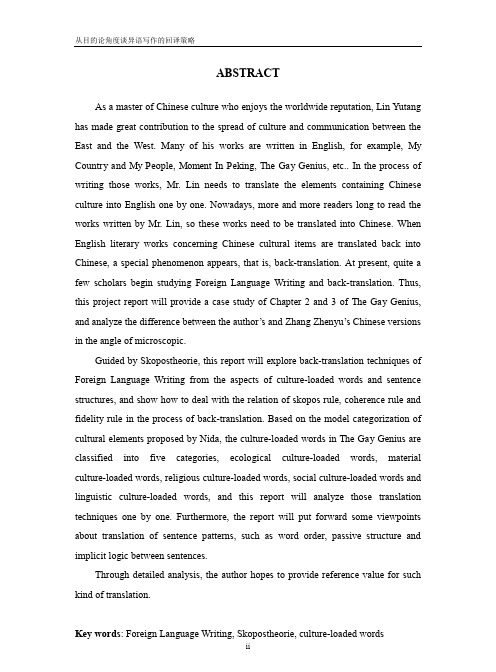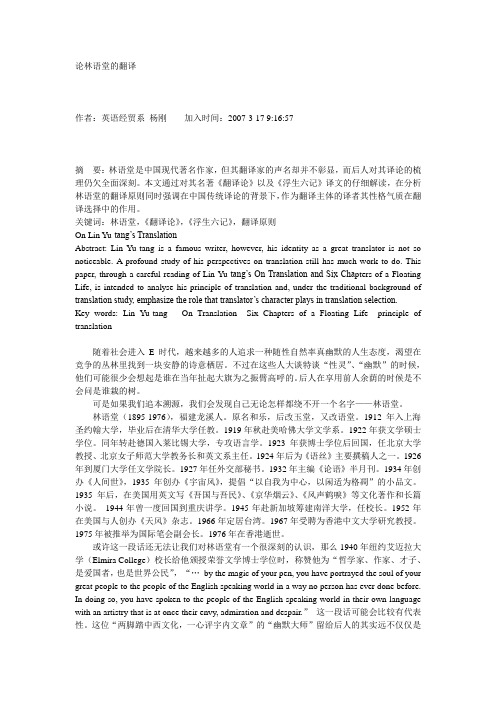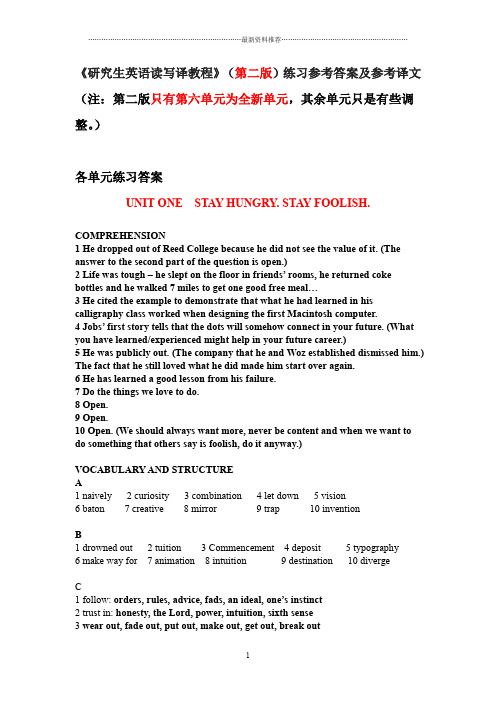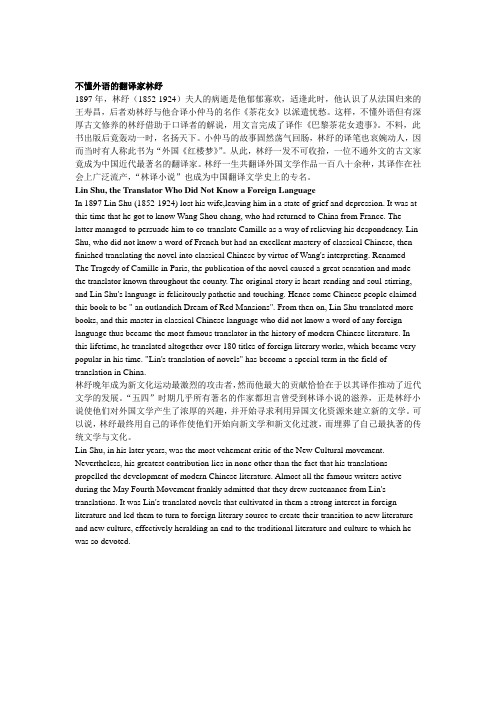A Study on the Back-Translation of LinYutang’s My Country and My People
从目的论角度谈异语写作的回译策略——以thegaygenius(节选)的翻译为例

ABSTRACTAs a master of Chinese culture who enjoys the worldwide reputation, Lin Yutang has made great contribution to the spread of culture and communication between the East and the West. Many of his works are written in English, for example,My Country and My People, Moment In Peking, The Gay Genius, etc.. In the process of writing those works, Mr. Lin needs to translate the elements containing Chinese culture into English one by one. Nowadays, more and more readers long to read the works written by Mr. Lin, so these works need to be translated into Chinese. When English literary works concerning Chinese cultural items are translated back into Chinese, a special phenomenon appears, that is, back-translation. At present, quite a few scholars begin studying Foreign Language Writing and back-translation. Thus, this project report will provide a case study of Chapter 2 and 3 of The Gay Genius, and analyze the difference between the author’s and Zhang Zhenyu’s Chinese versions in the angle of microscopic.Guided by Skopostheorie, this report will explore back-translation techniques of Foreign Language Writing from the aspects of culture-loaded words and sentence structures, and show how to deal with the relation of skopos rule, coherence rule and fidelity rule in the process of back-translation. Based on the model categorization of cultural elements proposed by Nida, the culture-loaded words in The Gay Genius are classified into five categories, ecological culture-loaded words, material culture-loaded words, religious culture-loaded words, social culture-loaded words and linguistic culture-loaded words, and this report will analyze those translation techniques one by one. Furthermore, the report will put forward some viewpoints about translation of sentence patterns, such as word order, passive structure and implicit logic between sentences.Through detailed analysis, the author hopes to provide reference value for such kind of translation.Key words: Foreign Language Writing, Skopostheorie, culture-loaded words目录摘要 (i)ABSTRACT.................................................................................................................. i i 第一章任务描述 (1)第一节任务背景 (1)1.1.1 《苏东坡传》的异语写作背景 (1)1.1.2 《苏东坡传》的张振玉译本简介 (1)第二节理论依据 (2)第三节异语写作及无本回译介绍 (3)第二章任务实施 (4)第一节译前准备 (4)2.1.1《苏东坡传》中异语写作的特色 (4)2.1.2 翻译目的的确立 (5)第二节翻译流程 (5)第三节翻译难点 (6)第三章案例分析 (7)第一节文化负载词的翻译策略 (7)3.1.1 生态文化负载词 (7)3.1.2 物质文化负载词 (9)3.1.3 社会文化负载词 (11)3.1.4 宗教文化负载词 (15)3.1.5 语言文化负载词 (16)第二节句式的翻译 (17)3.2.1 语序的处理 (17)3.2.2 被动句的翻译 (18)3.2.3 句子间隐性逻辑的处理 (19)第四章结语 (22)第一节对该翻译项目的认识 (22)第二节该翻译项目的意义及局限性 (23)参考文献 (25)附件(源语和译语文本) (26)致谢 (59)第一章任务描述深厚的古典文学功底和极高的英语造诣,造就了一代学贯中西的国学大师——林语堂。
论林语堂的翻译

论林语堂的翻译作者:英语经贸系杨刚加入时间:2007-3-17 9:16:57摘要:林语堂是中国现代著名作家,但其翻译家的声名却并不彰显,而后人对其译论的梳理仍欠全面深刻。
本文通过对其名著《翻译论》以及《浮生六记》译文的仔细解读,在分析林语堂的翻译原则同时强调在中国传统译论的背景下,作为翻译主体的译者其性格气质在翻译选择中的作用。
关键词:林语堂,《翻译论》,《浮生六记》,翻译原则On Lin Yu-tang’s TranslationAbstract: Lin Yu-tang is a famous writer, however, his identity as a great translator is not so noticeable. A profound study of his perspectives on translation still has much work to do. This paper, through a careful reading of Lin Yu-tang’s On Translation and Six Cha pters of a Floating Life, is intended to analyse his principle of translation and, under the traditional background of translation study, emphasize the role that translator’s character plays in translation selection.Key words: Lin Yu-tang On Translation Six Chapters of a Floating Life principle of translation随着社会进入E时代,越来越多的人追求一种随性自然率真幽默的人生态度,渴望在竞争的丛林里找到一块安静的诗意栖居。
林语堂的“第三空间”和他的翻译《浮生六记》

南京师范大学硕士学位论文林语堂的“第三空间”和他的翻译《浮生六记》姓名:***申请学位级别:硕士专业:外国语言文学;英语语言文学指导教师:***20110514摘要林语堂是著名的学者,作家和翻译家,自20世纪20年代初开始在各类期刊上发表汉语和英语散文、杂文等,并逐渐形成自己“幽默’’、“闲适"、“性灵’’的写作风格。
林语堂在翻译上也有较高成就,翻译过许多作品,并撰写了“论翻译"等反映其翻译思想和观点的论文。
1936年,林语堂移居美国,开始了英文创作和汉英翻译的生涯,向西方人宣传中国文化。
他的作品深受西方读者的欢迎,并因《京华烟云》而获得诺贝尔文学奖提名。
“第三空间’’理论(tlle“tllirdspace”)是后殖民理论家霍米巴巴在他的代表作《文化的定位》中提出的概念。
巴巴认为在两种文化接触的地方存在一个“第三空间",文化间的差异在这个空间内发生作用。
这一空间的产物即为文化杂合体,它兼具两种文化的性质。
巴巴主张殖民与被殖民的情境彼此杂糅,形成“第三空间",并因而发展出存在于语言认同和心理机制之间、既矛盾又模糊的新过渡空间。
林语堂作为深受西方基督教文化和东方儒道佛文化影响的作家和翻译家,以他为个案研究其“第三空间”的建构以及“第三空间"对其翻译思想,翻译策略的影响是具有典型意义的。
本文共分五章,第一章总的介绍了林语堂的生平,前人对林语堂以及林语堂的翻译理论和翻译作品的研究,以及《浮生六记》的内容和它在中国古代文学史上的地位;第二章是理论部分,介绍了霍米巴巴的混杂理论和“第三空间”理论以及如何将“第三空间"理论应用于翻译学研究特别是对林语堂这个特别案例的研究;第三、第四章为主体部分,第三章介绍了林语堂东西文化的教育背景,分析了林语堂的“第三空间”是怎样一步一步建立起来的,以及在“第三空间"里,林语堂取得了怎样独特的成就;第四章以林语堂的《浮生六记》译本为例,分析了林语堂这位语言大师怎样熟练地驾驭英汉两种文字,运用多种翻译策略,既缩减了译文读者对原文的陌生感,同时又在一定程度上满足了译文读者对文化异质的期待;最后一章是结论,总结了本文研究的重要意义。
林语堂吾国吾民英文版

林语堂吾国吾民英文版In the English translation of Lin Yutang's "My Country and My People"China has a rich cultural history that has captivated the world for centuries. From its ancient traditions to its vibrant cultural heritage, China has become a topic of great interest and fascination. One notable figure who has contributed significantly to the understanding of Chinese culture is Lin Yutang, a renowned Chinese writer, translator, and philosopher. In his famous work "My Country and My People," Lin Yutang provides valuable insights into the essence of Chinese society and its people. In this article, we will explore the key themes and concepts presented in the English version of Lin Yutang's book.One of the main aspects emphasized by Lin Yutang is the importance of balance in Chinese culture. He argues that the Chinese people exhibit a unique ability to find harmony in the midst of chaos. This concept is deeply rooted in the philosophy of Confucianism and Taoism, which prioritize the equilibrium of opposing forces. Lin Yutang further explores this idea by discussing the significance of rituals and traditions in Chinese society. He notes that these practices help maintain social order and provide individuals with a sense of belonging and purpose.Language and literature also play a significant role in Lin Yutang's analysis of Chinese culture. He highlights the nuances and beauty of the Chinese language, emphasizing its ability to convey profound emotions and subtle meanings. Additionally, Lin Yutang examines Chinese literature and its impact on society. He discusses the works of renowned Chinese authorssuch as Lu Xun and emphasizes the literary treasures that China has to offer the world.Another theme explored by Lin Yutang in "My Country and My People" is the concept of family and kinship. He emphasizes the strong bonds and loyalty that exist within Chinese families, as well as the reverence for ancestors. Lin Yutang argues that the Chinese value the continuity of their lineage and maintain a deep respect for their heritage and ancestry.In addition to cultural aspects, Lin Yutang also sheds light on the economic and political challenges that China has faced throughout history. He critically examines the impact of foreign influences and modernization on Chinese society, highlighting both the positive and negative consequences. Lin Yutang argues for the importance of preserving traditional values while embracing progress and adapting to change.Lastly, Lin Yutang's "My Country and My People" serves as a bridge between East and West. He aims to provide Western readers with a comprehensive understanding of Chinese culture and society. This book offers insights into the Chinese way of life and helps dispel misunderstandings and stereotypes that exist between different cultures.In conclusion, Lin Yutang's "My Country and My People" offers an insightful and comprehensive exploration of Chinese culture. Through discussing themes such as balance, language, family, and society, Lin Yutang provides valuable insights into the essence of China and its people. This English translation of his work serves as a gateway for readers from different cultures to appreciate and understand the richness and complexity of Chinese civilization.。
中国文化特色词汇的音译与中国文化的传播

浅析中国时政术语的常用英译方法论杰里米·边沁的功利主义任务型教学模式在初中英语课堂教学中的现状分析--以xx学校初一学生为例论《蝇王》中戈尔丁对人性之恶的解析美中传统文化对于其家庭教育的影响从《鲁宾逊漂流记》看性格对命运的影响从校园流行语看中美学生思维方式的差异战争隐喻在体育新闻报道中的运用情感因素与初中生英语学习《永别了,武器》中的“有”和“虚无”从《所罗门之歌》中主人公的心路历程看美国黑人成长海明威的生态意识在《老人与海》中的体现现代叙事艺术与海明威的《永别了武器》交际教学法在高中英语语法教学中的研究Advertising and Its Application从《人与鼠》看斯坦贝克艺术风格《格列佛游记》与《镜花缘》的比较浅析哈克贝利的叛逆精神从跨文化的角度看翻译的归化与异化非语言交际在国际商务谈判中的运用对比评析《了不起的盖茨比》中尼克和盖茨比的梦想功能目的论指导下的公示语英译译者的身份从《红楼梦》和《简爱》看中西方女性主义战争、归乡、爱情—《冷山》的多元主题研究企业文化构建的话语分析路径论《宠儿》中象征主义的运用伊丽莎白班内特和姚木兰的比较研究浅谈中西婚俗的文化差异英语中的汉语借词折射出的中国对外关系史海明威文学作品中青年和老年人物关系对比探究英汉基本颜色词的文化内涵对比研究废墟上成长起来的南方新女性《灿烂千阳》中女性人物的忍耐,斗争和重生论《紫色》中的性别暴力浅谈文化差异对英语明喻汉译的影响关于初中生外语学习焦虑的分析影响英语阅读效果的主要因素与策略——针对大学英语四六级考试《南方与北方》中玛格丽特·黑尔的人物分析析《麦田里的守望者》主人公霍尔顿的人生选择论小说《看不见的人》中的象征主义浅析《老人与海》中的悲剧色彩The Application of Cooperative Learning in High School English TeachingThe Same Experience, Different Life—The Comparison between Jane Eyre and Lin Daiyu功能对等理论视角下《越狱》字幕翻译的研究The Countermeasures of Chinese Companies Facing Anti-dumpingAn Analysis of Y outh Subculture through the Movie--Trainspotting 浅析《哈克贝利•费恩历险记》的写作风格从异化与归化看网络上美剧的字幕翻译A Survey on Self-regulated Learning of English Major论《黄墙纸》中女主人公女性主义思想的局限性(开题报告+论)英语中的性别歧视《傲慢与偏见》中婚姻观对当代中国的现实意义命运与性格--浅论《哈姆雷特》的悲剧因素《德伯家的苔丝》环境细节描写的作用冰与火具有毁灭生命的同等威力——《呼啸山庄》主题探讨A Comparative Study of Politeness Expressions in English and Chinese 旅游广告资料翻译探讨从《当汽车等待的时候》看欧•亨利的写作特色美国校园俚语发展的促动因素看美国的自由精神从《宠儿》透视美国黑人女性的悲剧语境与商务英语信函写作外语学习动机的激发与培养Tradition and Beyond—Reading The Diviners as a Bildungsroman从语境视角浅析《生活大爆炸》中反语的幽默属性从文化角度看品牌名称翻译英语委婉语中的转喻现象分析从许渊冲的“三美”原则论李白诗歌的翻译中英酒俗对比英汉禁忌语对比分析The Tragic Destiny of Brett Ashley in The Sun Also Rises从中英文化差异谈英语隐喻的汉译Euphemism in English advertisements美国主流文化形成探析对小妇人心灵成长历程的探索悖论式的唯美主义--论王尔德的《道连•格雷的画像》论石黑一雄《别让我走》中新与旧的世界论《梅丽迪安》中主人公梅丽迪安的觉醒从功能对等理论谈中国小吃名英译浅析《献给艾米莉的玫瑰》中渐渐消失的玫瑰英语外教与中国英语教师写作教学风格对比研究A Southern Elegy—a Feminist Study on Faulkner’s A Rose for Emily别样的美丽——析《厄舍古屋的倒塌》中无处不在的哥特式风格论凯特肖班《觉醒》中的超验思想《动物农场》中隐喻的应用及其政治讽刺作用政论文的英译特点王尔德童话《夜莺与玫瑰》中的唯美主义从文化差异角度看中式菜单英译《红字》中善与恶的不同结局汉英禁忌语的对比研究《远大前程》中通过研究匹普对乔的态度转变来探讨他的成长经历《查特莱夫人的情人》中肉体与灵魂的平衡论苔丝悲剧的成因从合作原则看卡尔登的性格特点Three Discriminations to Little Black American Girls in The Bluest Eye《虹》的象征主义及其生态意识英式英语与美式英语的区别论风格的可译性黑人英语与非裔美国黑人文化的研究The modern American and Death of a salesmanA Comparative Study on the Celebrations of Traditional Chinese and Western Festivals任务型教学法在初中英语口语教学中的应用研究从禁忌语的差异看中英文化的差异网络在中学英语教学中的应用狄更斯小说《远大前程》中的批判现实主义特点解读论妇女解放历程在《紫色》中的体现——以主人公西丽为例《最蓝的眼睛》的叙述声音和视角《基督山伯爵》中大仲马性格的显现及其对主人公言语行为的影响视频辅助和背景知识对听力理解的作用中式英语特点及发展趋势“美国梦”的幻灭——论《人与鼠》的社会悲剧《汤姆•索亚历险记》的艺术魅力基于《生活大爆炸》研究合作原则的违反浅析《飘》中女性主义的萌发从《哈克贝里﹒费恩历险记》看马克﹒吐温的幽默讽刺艺术爱神简论《看不见的人》的象征意义中西神话中的创世神话论《野性的呼唤》中对人和自然和谐的呼唤罗伯特•弗罗斯特与陶渊明田园诗歌对比研究Transcendentalism in Thoreau's Walden浅谈英汉人体部位的隐喻应酬语的中英文比较The Analysis of Narrative Techniques in William Faulkner’s “A Rose for Emily”The Impact of Gender Differences on Language Learning Strategies身势语在演讲中的重要性和运用研究软文中的隐喻研究Comparison of Chinese Lunar New Y ear and Western Christmas Day—from the Perspective of the Ways of Celebrations《呼啸山庄》中男主人公人物分析从生态批评视角解读海明威作品论国际商务中的跨文化有效沟通课堂英语教学与网络英语教学的对比《喜福会》中母爱主题的文化阐释从《通往雨山之路》看美国印第安文化的逐渐衰落《德伯家的苔丝》苔丝和《红字》海斯特的悲剧命运的比较A Pragmatic Analysis of Oxymoron in Advertising习语及习语的汉英翻译Study on the Basic Principles of Legal English Translation从“联想”看中国企业国际化的影响因素及其战略选择论《红字》中的清教主义思想基于网络的英语听力学习的优势与局限研究解析凯特肖班的《觉醒》中的哥特因素:浅析维多利亚时期妇女文学的觉醒Slips of Tongue in English Learning as a Second LanguageOn Michael Moore's Fahrenheit / From the Rhetoric Perspective从电影名的翻译看直译与意译论《围城》中的语码转换英汉问候语对比研究接受美学指导下的电影字幕翻译——以《冰河世纪II》为例奈达等值理论于商务英语翻译中的理解和应用论华裔女星在好莱坞电影中的角色转变浅析《不存在的人》中主人公的觉醒比较中美民事诉讼文化的价值取向广告语及商标翻译论《大卫科波菲尔》中人物个性与时代背景的关系《追风筝的人》作为成长小说的的体裁分析拒绝话语跨空间映射的认知解读—以商务洽商为例不同国家的商务谈判风格及其对策Communicative Functions of Silence in Conversations化妆品商标的文化内涵与翻译爱伦坡短片小说“美女之死”主题研究《善良的乡下人》的喜剧性分析论《最后的莫西干人》中的印第安情结卢梭的浪漫主义思想在《远大前程》中的反映论莱辛作品《又来了,爱情》中妇女失爱的原因中学英语教师课堂反馈对学生焦虑的影响简爱和林黛玉不同命运的文化透析论《傲慢与偏见》中简奥斯丁的女性意识Psychological Analyses of Sethe in Beloved《哈利波特》系列里哈利波特与伏地魔的二元对立分析威廉•麦克佩斯•萨克雷《名利场》的道德研究顺应理论视角下《红楼梦》中委婉语的英译中英手机短信的修辞特点分析英语教学中的跨文化意识的培养论《最蓝的眼睛》中的黑人文化传统灰姑娘情结在《理智与情感》中的表现苔丝和傲慢与偏见中的女性意识之对比研究试析中文歌曲汉英语码转换的形式与功能《蝇王》中神话元素的象征意义中医在英语世界的翻译与传播:过去与现在对非英语专业大学生英语自主学习能力的调查《红楼梦》两英译版本中姓名翻译的对比研究从“水”的隐喻看中西文化的差异An Analysis of Communicative Language Teaching Method in Teaching Spoken English in China Stopping by Woods on a Snowy Evening的三中译本----各译作对原作忠实度的对比评析英汉动物习语文化内涵对比研究中美文化差异对外贸谈判的影响A Study of Pragmatic Functions of Fuzzy Language in English Advertisements美国“寂静五十年代”的骚动——《麦田里的守望者》主人公分析简论爱伦•坡的建筑意象从归化和异化的角度看张谷若《德伯家的苔丝》的翻译打破沉默——接骨师之女中“沉默”主题的解读中国文化特色词汇的音译与中国文化的传播汤姆叔叔的小屋中汤姆形象分析Schema Theory on the English V ocabulary Teaching in High School东西方人名文化与翻译—以英汉人名为例通过《喧哗与骚动》中三兄弟各自对于凯蒂的叙述分析三人各自性格特征荒原背景下《还乡》和《呼啸山庄》女主人公爱情悲剧的比较分析。
comparative_translation

The broken spear that sank under the river’s sand is still intact,
By cleaning and sharpening one can recognize its previous dynasty;
Tr. Lin Chian-Ming
圖片來源: /s/blog_4919241n Huai (泊秦淮)
Chiu Chia (酒家)
圖片來源: /imgres?imgurl=/bmiddle/58cc35a2g73d8925b19a a%26690&imgrefurl=/s/blog_58cc35a20100f6pn.html&usg=__EgOZnCx /u/photos/35020
Inaccuracy of Diction or Inappropriate Wording
Poem 11 Chih Pi (赤壁)
折戟沈沙鐵未銷, 自將磨洗認前朝。
We dig out broken halberds buried in the sand
And wash and rub these relics of an ancient war.
Alone I like the riverside where green grass grows And golden orioles sing amid the leafy trees.
Tr. Xu Yuan-zhong
’Tis a pity tender grasses are grown on brook side, On top of the thick forest orioles keep on singing;
研究生英语读写译第二版1-7课练习参考答案和参考译文精编版

《研究生英语读写译教程》(第二版)练习参考答案及参考译文(注:第二版只有第六单元为全新单元,其余单元只是有些调整。
)各单元练习答案UNIT ONE STAY HUNGRY. STAY FOOLISH. COMPREHENSION1 He dropped out of Reed College because he did not see the value of it. (The answer to the second part of the question is open.)2 Life was tough –he slept on the floor in friends’ rooms, he returned coke bottles and he walked 7 miles to get one good free meal…3 He cited the example to demonstrate that what he had learned in his calligraphy class worked when designing the first Macintosh computer.4 Jobs’ first story tells that the dots will somehow connect in your future. (What you have learned/experienced might help in your future career.)5 He was publicly out. (The company that he and Woz established dismissed him.) The fact that he still loved what he did made him start over again.6 He has learned a good lesson from his failure.7 Do the things we love to do.8 Open.9 Open.10 Open. (We should always want more, never be content and when we want to do something that others say is foolish, do it anyway.)VOCABULARY AND STRUCTUREA1 naively2 curiosity3 combination4 let down5 vision6 baton7 creative8 mirror9 trap 10 inventionB1 drowned out2 tuition3 Commencement4 deposit5 typography6 make way for7 animation8 intuition9 destination 10 divergeC1 follow: orders, rules, advice, fads, an ideal, one’s instinct2 trust in: honesty, the Lord, power, intuition, sixth sense3 wear out, fade out, put out, make out, get out, break out4 play writer/playwright, speedwriter, blog writer, letter writer, editorial writer5 habitual, textual, accentual, sexual, spiritual, conceptual6 shocking, stunning, eye-catching, astonishing, striking, dazzling SPEAKING: Open.TRANSLATIONA1热烈的鼓掌2波涛汹涌的海面3熟睡4烟瘾大的人5油腻而难消化的食物6烈酒7悲痛的消息8沉闷冗长的读物9〈化〉重水10他在一家法国银行拥有外国人账户。
不懂外语的翻译家林纾

不懂外语的翻译家林纾1897年,林纾(1852-1924)夫人的病逝是他郁郁寡欢,适逢此时,他认识了从法国归来的王寿昌,后者劝林纾与他合译小仲马的名作《茶花女》以派遣忧愁。
这样,不懂外语但有深厚古文修养的林纾借助于口译者的解说,用文言完成了译作《巴黎茶花女遗事》。
不料,此书出版后竟轰动一时,名扬天下。
小仲马的故事固然荡气回肠,林纾的译笔也哀婉动人,因而当时有人称此书为“外国《红楼梦》”。
从此,林纾一发不可收拾,一位不通外文的古文家竟成为中国近代最著名的翻译家。
林纾一生共翻译外国文学作品一百八十余种,其译作在社会上广泛流产,“林译小说”也成为中国翻译文学史上的专名。
Lin Shu, the Translator Who Did Not Know a Foreign LanguageIn 1897 Lin Shu (1852-1924) lost his wife,leaving him in a state of grief and depression. It was at this time that he got to know Wang Shou chang, who had returned to China from France. The latter managed to persuade him to co-translate Camille as a way of relieving his despondency. Lin Shu, who did not know a word of French but had an excellent mastery of classical Chinese, then finished translating the novel into classical Chinese by virtue of Wang's interpreting. Renamed The Tragedy of Camille in Paris, the publication of the novel caused a great sensation and made the translator known throughout the county. The original story is heart-rending and soul-stirring, and Lin Shu's language is felicitously pathetic and touching. Hence some Chinese people claimed this book to be " an outlandish Dream of Red Mansions". From then on, Lin Shu translated more books, and this master in classical Chinese language who did not know a word of any foreign language thus became the most famous translator in the history of modern Chinese literature. In this lifetime, he translated altogether over 180 titles of foreign literary works, which became very popular in his time. "Lin's translation of novels" has become a special term in the field of translation in China.林纾晚年成为新文化运动最激烈的攻击者,然而他最大的贡献恰恰在于以其译作推动了近代文学的发展。
- 1、下载文档前请自行甄别文档内容的完整性,平台不提供额外的编辑、内容补充、找答案等附加服务。
- 2、"仅部分预览"的文档,不可在线预览部分如存在完整性等问题,可反馈申请退款(可完整预览的文档不适用该条件!)。
- 3、如文档侵犯您的权益,请联系客服反馈,我们会尽快为您处理(人工客服工作时间:9:00-18:30)。
一一一一一一一一翻译研究本栏目责任编辑:梁书A Study on the Back-Translation of LinYutang ’s My Country and My PeopleFU Xue-mei(Huazhong University of Science and Technology,Wuhan 430074,China)Abstract:The version back-translated by Lin ’s friend Huang Jiade in 1930s promoted My Country and My People to new heights and won the authority.For the sake of readers ’benefits,Huang applied domestication to reconstruct Chinese culture embodied in Lin ’s work.This thesis is intended to study Huang Jiade ’s version of My Country and My People from the perspective of Skopos Theory.Guided by the three Skopos Rules,Skopos,fidelity and coherence,the author will analyze the domestication strategy ap-plied by Huang Jiade.The author finds out that Huang applied substitution,amplification and omission to domesticate the origi-nals for respective purposes.The author also hopes to cast a light for the latter researchers on improving the back-translation of cultural-elements in this kind of special literary works.Key words:My Country and My People;Skopos Theory;domestication 中图分类号:H315.9文献标识码:A 文章编号:1009-5039(2016)17-0128-02If Lin ’s composition opens a window to the readers in western world displaying the new and old China,Huang Jiade ’s version opens a door for a book that once rafted in other countries going back home.The target readers have changed,the native Chinese people are the main receivers.In Skopos Theory,the status of tar⁃get readers is stressed,the skopos of Huang Jiade ’s version is to in⁃troduce My Country and My People back into China.Accordingly he applied the domestication strategy throughout the version.In de⁃tails,the author will illustrate the translation techniques such as substitution,amplification,omission.For another,Amplification and omission techniques applied to domesticate intercultural elements meeting the need of Chinese readers.These translation techniques are relatively flexible which are typically followed by Skopos rule.In addition,it is obvious that Huang keens on concise and ele⁃gant sentence patterns of Classical Chinese in order to adapt to the language style in 1930s,andthe “literariness ”of Huang ’s language can match Lin ’s reputation.Literature translation require that thet⁃ranslator needs not only accurate translation,but also needs to translate the author's writingstyle,that is to say,the author ’s style is the standard to measure whether the translator doesthe work well or not.The following will explain how Huang domesticated Lin ’s work guided by Skopos Theory.1SubstitutionSubstitution translation or borrowing translation is an effective approach in translation.It is often used in translating the culture-loaded elements that are not familiar to every person in the target culture.Sometimes translators can borrowidiomatic expressions in local culture to translate foreign elements which maybe strange to target readers.In some cases,they can ’t be literally translated or free translated.But there are equivalent words in the target lan⁃guage that can substitute them and reach the function of culturecommunication.In fact,localizing and nationalizing the foreign cul⁃ture are the purposes of substitution translation.When Lin first published My Country and My People in America,his first goal was to refresh the vision of China in foreigners ’mind.In order to make Chinese culture understood by people in different culture environ⁃ment,he must foreignize things particular in China.Accordingly,when Huang back-translated it to mother country,he has to local⁃ize the elements once foreignized by Lin,especially when he trans⁃lated the poems in Chinese specific-culture.Here are some typical examples:Example1:Lin:I have just bought me a five-foot knife,I swing it with a gleaming cadence.I fond it three times a day,I won ’t change it for fifteen maidens.(Lin,2001:24)Huang:新买五尺刀,悬著中梁柱。
一日三摩掌,剧于十五女。
(Huang,2008:26)“Foot ”is a measure unit in European Countries,and “尺”on⁃ly used in China.One Chinese “尺”equals to 1.094feet.“five-foot ”in Lin ’s original is more than “五尺”in Huang ’s version,which seems to obey the fidelity rule in Skopos Theory,or transla⁃tor could choose “五英尺”and attach footnotes.However,this liter⁃altranslation may broke the poetic beauty and influence the read⁃ers ’readability.Instead,Huang kept the original “五尺”to meet reader ’s need and keep the intended meaning the writer wanted to conduct.The examples listed above are all classic expressions in Chi⁃nese history or in nowadays and known to most of target readers—local Chinese people.The substitution applied by Huang is not on⁃ly exactly loyal to the original text,but also realizes the purpose of keeping the Chinese culture as it is.For terms like “chest-binding jacket (肚兜)”,in which if “jacket ”was translated as “夹克”,it would not be as suitable as “肚兜”,because “肚兜”is special in收稿日期:2016-07-05修回日期:2015-07-15作者简介:付雪梅,女,云南保山人,研究生,研究方向:汉语国际教育。
